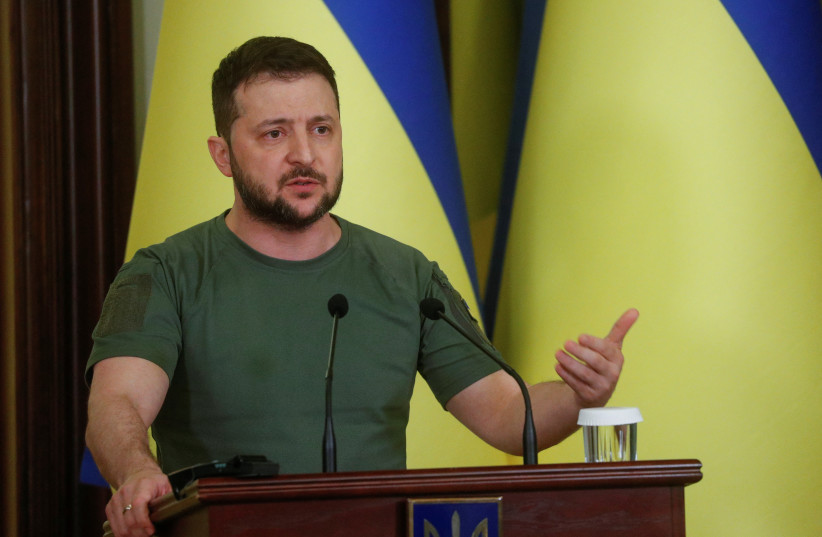Israel supports neo-Nazis in Ukraine, the Foreign Ministry in Moscow claimed on Tuesday, a day after leaders in Jerusalem lambasted Russian Foreign Minister Sergey Lavrov for claiming Hitler had Jewish origins.
The accusation also followed the Israeli Foreign Ministry summoning Russian Ambassador to Israel Anatoly Viktorov to a meeting with Deputy Director-General for Eurasia Gary Koren, and the sides agreed to no longer discuss the matter in public, according to a diplomatic source.
Despite that, the Russian ministry said in a statement that Foreign Minister Yair Lapid’s comments condemning Lavrov were “anti-historical,” and “explain to a large extent why the current Israeli government supports the neo-Nazi regime in Kyiv.”
Moscow reiterated Lavrov’s point that Ukrainian President Volodymyr Zelensky’s Jewish origins did not preclude Ukraine from being run by neo-Nazis.
“Antisemitism in everyday life and in politics is not stopped and is on the contrary nurtured [in Ukraine],” Russia’s Foreign Ministry said in a statement.

Moscow also mentioned “cooperation between Jews and Nazis” such as “Judenrats,” Jewish councils that reported to the Nazis, while conceding that the phenomenon was marginal. It argued that those Jews “were forced to participate in crimes,” while Zelensky “does this quite consciously and quite voluntarily,” using his Jewish origin to cover for neo-Nazis. It accused Latvian President Egils Levits of doing the same.
Lapid and the government of Israel, it said, “cynically... ignore the epidemic of destruction and desecration of monuments to the real righteous people of the world: the soldiers of the Red Army, who stopped the Holocaust and saved the Jewish world.”
The Israeli Foreign Ministry had no comment on the latest remarks.
Lavrov said in an interview with Italy’s Rete 4 on Sunday, “When they say, ‘What sort of denazification is this if we are Jews?’, well, I think that Hitler also had Jewish origins, so it means nothing. For a long time now we’ve been hearing the wise Jewish people say that the biggest antisemites are the Jews themselves.”
Asked about the meeting with the Russian ambassador, Lapid told KAN Bet on Tuesday, “It would be correct to assume that it was a very difficult conversation.”
LAVROV’S STATEMENT was “unforgivable,” Lapid said, echoing statements he made earlier in the week. “It’s to accuse Jews of their own Holocaust. Hitler wasn’t Jewish and Jews didn’t kill my grandfather in Mauthausen. The Nazis did it.”
Lavrov “should start by reading a history book,” Lapid added. “Hitler was not Jewish. That is an antisemitic rumor. The Russian government needs to apologize to the Jews and the memory of those killed. It was a terrible thing to say.”
Lapid said Israel tried to understand what Russia meant by the statement, and considered that it might have been a way to try to discourage Jerusalem from speaking out against the war in Ukraine, as the foreign minister did from the first day of the invasion by Russia.
“We are protecting our national security interest, but Israel is not just [about] interests; it is values,” he said. “Part of our scale of values is that the Russian invasion is not justified and has to stop. We say it and vote in international institutions when we need to.
“We protect national interests in Syria,” Lapid said in reference to Israel’s military coordination with Russia, “but no one will tell us we can’t express a moral position.”
Prime Minister Naftali Bennett relayed his most explicit condemnation of a Russian official since the war on Ukraine began in response to Lavrov.
“Lies like these are meant to blame the Jews themselves for the most terrible crimes in history, which were committed against them, and thus free the oppressors of the Jews from their responsibility,” he said. “As I’ve already said, no war today is the Holocaust nor is it like the Holocaust. The use of the Holocaust of the Jewish people as a political battering ram must be stopped immediately.”
Several Western leaders spoke out against Lavrov’s comments on Monday, including US Secretary of State Antony Blinken, who said his “friend Yair Lapid put it perfectly.”
“It is incumbent on the world to speak out against such vile, dangerous rhetoric and support our Ukrainian partners in the face of the Kremlin’s vicious assault,” Blinken tweeted.
Italian Prime Minister Mario Draghi, in whose country the Lavrov interview was first broadcast, criticized the interviewer. Rete4 is owned by former Italian prime minister Silvio Berlusconi, who had a close relationship with Russian President Vladimir Putin, though Berlusconi said he was disappointed by the invasion of Ukraine.
Italy has freedom of speech, Draghi said according to German news site DW, but “it is worth thinking about how acceptable it is to invite someone for an interview and not react to that person’s statements. It was not a journalistic achievement. It gives a very strange feeling.”
Reuters contributed to this report.
